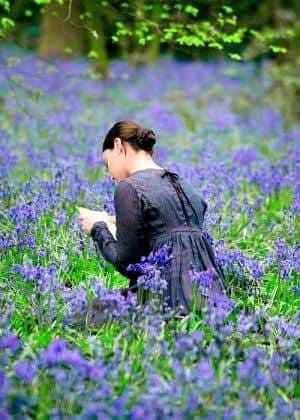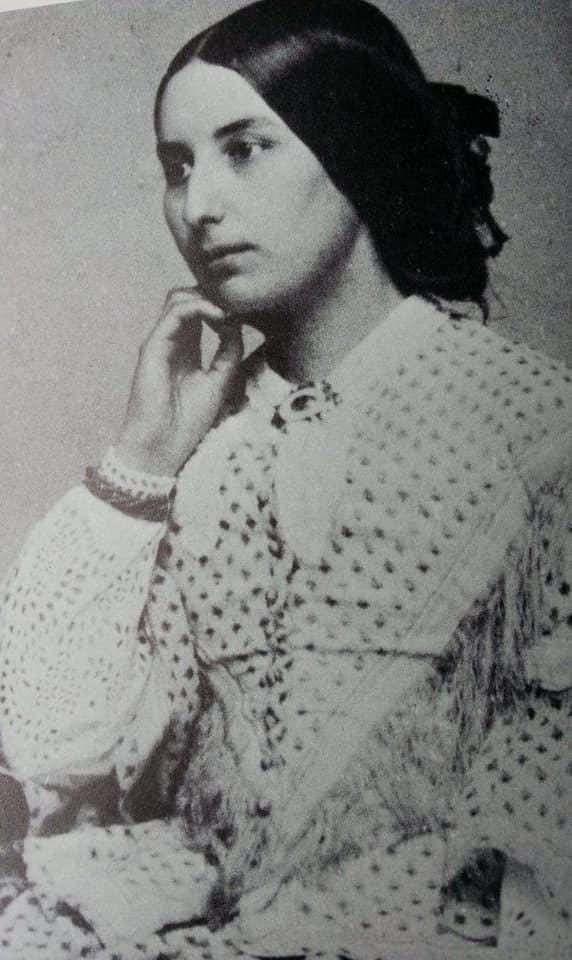A little something from the archives today because its spring and love is in the air. This is my favorite love story of all time. John and Fanny. Keats forever!
I blame it on the water lilies. This descent into the romance that is John Keats and Fanny Brawne in "Bright Star".
Jane Campion weaves the most exquisite visual story as poetic as any of the lovely missives from Keats' pen. I can watch this movie over and over and still find some lovely gem waiting for me there that I had not seen before. And I always leave it thinking beauty is still alive and fully understood. And it brings gladness.
It is a story that fills me with the deepest of joys and yet is filled with almost unbearable ache. How can that be? How is it that love leads into briars and thorns and we enter in knowing full well we may die - but we cannot but follow - we never question that we will follow. That is how it is with Fanny and John. It does not begin so, but ends so - and we quietly watch the magic happen. Love almost visibly tying two souls fast to each other.
Fanny is not at all poetic at the beginning. But she is an artist of sorts. She designs and stitches her own dresses and hats. They are original and flirtatious and unique. She is not an intellectual nor a 'reader' of verse, and is judged so by all the more literary in her circle. They think her shallow and coy. She is a fine dancer and her card is always full at the neighborhood dances. She is witty and can wrap unsuspecting young men around her finger. She meets Keats at a family friend's party. He calls her Minx as if to acknowledge her status among the throng of young men about her. But he intrigues her. He is not like the other men. She cannot say why. She wants his good opinion. She finds out he is a poet.
She searches out his book of poetry in the local bookshop and buys it. The first poem she reads begins with: "A Thing of Beauty is a Joy forever..." She looks up after reading it and appears almost surprised at the sound of the words. She knows that to be true through her own artistry. She starts reading his other poems and of course cannot really understand them - but she cannot put them down. Meanwhile Keats and his Companion move next door for the summer.
And Fanny, usually so confident and in charge, finds herself furtively showing up at his door to ask him to teach her how to read poetry and understand it. His companion Mr. Brown just laughs, But Keats sees something in this humility. It is the beginning of their love story. They want to be together all the time. He begins to write his poems about - her. She becomes more tender and more vulnerable to his growing tenderness for her. You watch it grow and happen slowly over time until you know they are held fast in it and there is no possibility of going back.
The thorns and briars enclose them now. He is penniless and without a job. He is in great debt. He knows he cannot marry her. It would not be fair to her family. He is honorable. He is not like other artists who woo, seduce, and then 'help themselves'. The greatest beauty of this story is that sex does not overbear. It is blessedly in the background of a greater love story. Keats never takes advantage of Fanny. Ever. And yet their love is so deep and passionately beautiful.
He tries nobly to cut it off and to spare her heartache by going away. Telling her dutifully to find another, get married and be happy. He knows that is useless talk. She finds herself unable to be without him. She tells her mother: "Is this love? This pain? If it is I will never poke fun at anyone again who tells me they are in love" The letters that pass between them are filled with longing and hope, though also in underlying acceptance of the situation. Yet, they love on. They cannot help but do so.
And through the pain of surrendering to a love that cannot be fulfilled, Fanny suddenly understands Keats' poetry at last. As though it is suffering that gives understanding to the words. She begins to read his poems aloud with deep understanding in her voice. Suffering brings the meaning to poets.
That was the revelation to me this time. Poetry's meaning is distilled through suffering. How can that be? But it is.
Keats eventually contracts tuberculosis and must leave Fanny for the softer climate of Italy which his poet friends insist upon. Her mother, knowing that he is dying, lovingly allows Fanny and him to be engaged. They both know he will not return from Italy and the final good bye is wrenching.
There is no marriage. Keats does die in Italy. Fanny is devastated. Yet, still they love each other until the end. And you would think - where is the happy ending? Surely this cannot be the story. And yet it is. And somehow you are....happy. You love it and don't want it to be any other way. Love as strong as death. Love that binds so tightly that you are helpless to free yourself - you don't want to free yourself though you are surrounded by defeat and briars and thorns.
What is this thing, love? That endures suffering, that finds understanding in poetry and no where else sometimes. This story brings only joy in the end. That such a thing exists in the human heart.
That is what Jane Campion is asking us to think about. It is astounding.









Lovely movie, costuming is exceptional.
Can't wait to see this movie! One of my favorites is 'You've Got Mail' with Meg Ryan and Tom Hanks. I found her to be extremely delightful in her role. By the way, I am looking so forward to what words your lovely heart will use to describe Pentecost and the Ascension and and and...